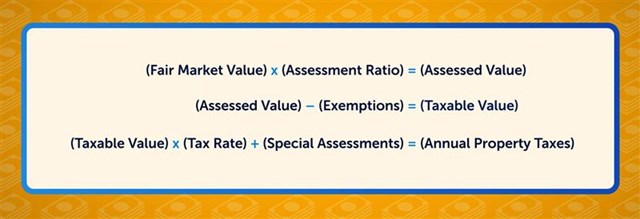If you’re considering purchasing a home, especially a retirement home, you may find it beneficial to research property taxes before you make a move. Property tax systems can vary significantly from state to state, and even between local municipalities. Understanding how property taxes are calculated in the area you wish to purchase your home can give you some insight into what you’ll be required to pay, what tax exemptions are available and how to make an appeal should any errors or discrepancies arise. Let’s take a look at some general property tax criteria. For illustrative purposes, we’ll compare California and Texas.
Why Tax Property?
State and local governments use taxation to generate revenue to fund public services such as police and fire departments, school districts, libraries and infrastructure. The three primary tax sources that governments tend to use are sales, income and property tax. Some states do not collect sales tax or income tax and therefore rely heavily on property tax. For instance, California collects both income and property tax but income tax is not collected in Texas. In most states, revenue collected from counties, municipalities, townships and school districts generally accounts for a significant portion of the property tax revenue. The remaining portion is levied by special assessment districts, which include specific services such as water and sewer authorities.
It’s important to point out that a heavy reliance on property tax revenue does not necessarily suggest a high overall tax burden in any given state. Interested in learning which states have the highest and lowest property taxes, and where your state ranks? Click here to view a ranking of state property taxes from lowest to highest.
The Basic Property Tax Formula

Calculating the Assessed Value of a Property
Property taxes are an ad valorem tax, which means taxation is calculated based on the assessed value of the property. In most cases, the assessed value is calculated as a percentage of the property’s market value, or the price that it would sell for. This percentage is known as the assessment ratio and can range anywhere between 0 and 100 percent. A 100 percent assessment ratio means the property is assessed at market value. Such is the case for all residential properties in Texas.
An assessor or appraisal district generally holds the responsibility of determining assessed value after the initial purchase of the property. To do so, they gather property information such as location, square footage, number of rooms, amenities and upgrades, and compare it to recently sold properties in the area. In many jurisdictions, this process is conducted annually. In some jurisdictions, however, it can occur every two to three years or even less frequently. As we all know, the housing market can be quite unpredictable, with property values both decreasing and increasing over time. This means that as your property value decreases or increases, so will your property tax bill. Increasing property tax bills could be cause for concern if you’re not financially prepared. Some taxing units, however, impose a limit or cap, on how much the assessed value can increase each year. For example, in Texas the cap is 10 percent while in California it’s 2 percent.
If an assessor makes an error, it can significantly alter the overall assessment of the property. It’s important to always review your property tax bill to decipher if you’re in agreement with the assessed value listed. In order to make a sound decision, take some time to research information about recently sold homes in your area. If you’re in a non-disclosure state and the information is not readily available, contact a real estate professional for assistance with Multiple Listing Service (MLS) records. If you find that you’re not in agreement, consider contacting your local taxing office for information about filing a tax appeal. If you’re not willing to take on the appeal alone, retain services from a tax appeal expert.
In California, the process of computing assessed property value is markedly different. Because of an amendment to the California Constitution in 1978, referred to as Proposition 13, the assessed value is equal to the property’s purchase price and increases each year according to the rate of inflation measured by the California Consumer Price Index (CPI) or 2 percent, whichever is less. The property’s market value is only reassessed with new construction or a change in ownership, which could result in a one-time separate supplemental tax bill (or negative supplement tax bill and refund) mailed directly to the homeowner. The supplemental tax bill will show the change in assessed value from the day escrow closed, or notice of new construction, through the end of the fiscal tax year.
Tax Exemptions
Many taxing authorities offer property tax exemptions to help homeowners lower their overall property tax bill. There are various tax exemptions available. Each will vary based on specific rules and regulations imposed by state and local law. To find out what options are available to you in your area, and how to apply, contact your local taxing authority. Some of the more common exemptions include:
- Homestead
- Senior Citizen
- Disability
- Military Service
Before applying for any tax exemptions, consider seeking guidance from a tax professional.
Applying the Tax Rate
Once the assessor has subtracted the exemptions from the assessed value, it’s time to apply the property tax rate. The tax rate can be levied at the state, county and local level and, therefore, varies significantly by jurisdiction. The tax rate can be recalculated each year, but some taxing units impose a cap much like assessed value.
The tax rate is generally expressed as a percentage that is multiplied by the taxable value. So, if the taxable value of the property is assessed at $600K and the taxing unit has a tax rate of 1 percent, the homeowner would pay $6K in property taxes. Some jurisdictions identify the tax rate by a number of mills. To calculate the mill rate, the number of mills is divided by 1,000. For instance, if the number of mills is 15, the millage or property tax rate would be 1.5 percent.
Texas does not impose a state property tax. All property taxes in Texas are imposed at the local governing level. California, on the other hand, has a 1 percent tax rate imposed by the state. All other local taxing units must not impose a tax more than the 2 percent cap provided under Proposition 13.
Special Tax Assessments
Special tax assessments are additional and temporary charges added to the property tax bill but are not generally calculated as a percentage of the assessed value. Most often, they are used to pay for local infrastructure projects such as maintenance of roads, sidewalks and sewer lines in a particular neighborhood. To find out if the property you’d like to purchase is in a special tax assessment district, contact your local taxing authority.
When & How to Pay
Depending on where you live, property taxes can be collected quarterly, semi-annually or annually. You can opt to pay your property taxes directly or through an escrow or impound account set up with your mortgage lender. As a homeowner, it will be your responsibility to make sure all property tax payments are made on time. Not making timely payments can result in penalties. If you fail to make payments, the taxing authority can place a lien on your property. Once a lien is placed on the property, the taxing authority can hold a tax sale, which is similar to a foreclosure.
Property taxes are an expense that every homeowner is required to pay, even after the mortgage loan has been paid in full. Property taxes vary widely by jurisdiction and, oftentimes, are considered complex and difficult to comprehend. Researching how property taxes are calculated in your local area, before you purchase property, can help you prepare financially and provide peace of mind. When you’re ready to take the leap into homeownership, Old Republic Title is here to assist you with all your title and escrow needs. To find out what title insurance and closing services options are available, contact your local Old Republic Title representative today.
This article provides general information about state and local property taxes. The information provided should not be construed as legal, tax, accounting or any other professional advice or service. Before making any decision or taking any action about your property taxes, we recommend you consult with a competent professional familiar with your particular situation. Old Republic National Title Insurance Company (“Old Republic Title”) makes every attempt to ensure all information contained in this article is reliable, however, we provide this information with no guarantee of accuracy or completeness and make no warranty, express or implied. Old Republic Title is not responsible for any errors or omissions, or for results obtained from the use of information contained within this article.




